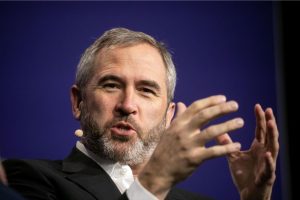In a recent Bloomberg interview shared by crypto commentator Crypto Eri, Ripple CEO Brad Garlinghouse offered significant insights into various topics surrounding the cryptocurrency industry.
He spoke about regulatory concerns, Ripple’s role in the political landscape, the potential for a U.S.-based XRP exchange-traded fund (ETF), and the growing mainstream interest in stablecoins. Garlinghouse’s comments reflect optimism about the future of the crypto industry despite challenges, particularly in the U.S. regulatory environment.
The Impact of U.S. Crypto Regulation
Garlinghouse began by addressing the U.S. regulatory approach to the cryptocurrency industry, specifically the actions of the current administration. He expressed confidence that the Biden administration’s approach to regulating the crypto industry would soon come to an end.
He mentioned that regardless of the outcome of the 2024 U.S. presidential election, a “more constructive engagement” with the crypto industry was inevitable. Garlinghouse emphasized the importance of the U.S. leading the world in crypto innovation, much like it did with the Internet of Information.
He also highlighted how the U.S. lags behind countries such as the U.K., Switzerland, Singapore, and Japan in providing clear regulatory frameworks for the crypto industry. In his view, the lack of regulatory clarity in the U.S. has hampered the growth and development of the sector, while other nations have taken the lead by providing rules that encourage innovation.
Political Landscape and Ripple’s Neutrality
The conversation naturally turned to Ripple’s political involvement, particularly with its co-founder Chris Larsen’s donations to the Kamala Harris campaign. Garlinghouse, however, reaffirmed his stance of being “fiercely independent.”
He acknowledged that Republicans have generally been more proactive in their approach to crypto regulation, noting a recent bipartisan bill in the U.S. House of Representatives where a significant number of Democrats joined Republicans in supporting clear crypto regulations.
He expressed optimism that the Harris campaign may reconsider the current administration’s flawed approach to the industry. Garlinghouse remains hopeful that whoever leads the U.S. post-election will bring about the necessary regulatory reset to foster innovation and competitiveness in the crypto space.
XRP ETF and Institutional Demand
Another focal point of the interview was the growing institutional interest in cryptocurrencies, specifically regarding exchange-traded funds (ETFs). Garlinghouse pointed to the success of the Bitcoin ETF, which saw around $17 billion in inflows since its approval by the U.S. Securities and Exchange Commission (SEC). He acknowledged that while Bitcoin ETFs have led the charge, there is also considerable interest in ETFs tied to XRP.
Garlinghouse expressed confidence that an XRP ETF was “inevitable.” He mentioned several XRP-related ETF filings, highlighting a growing trend of institutional adoption in the crypto space. This, according to Garlinghouse, is likely to place upward pressure on the price of XRP and other cryptocurrencies as institutional investors become more involved.
The Ongoing SEC Battle and Regulatory Clarity
When asked about Ripple’s ongoing legal battle with the SEC, Garlinghouse voiced his frustration. He described the SEC’s recent appeal of a court judgment, which had favored Ripple, as market manipulation. Despite this, Garlinghouse underscored that the fundamental issue—whether XRP is a security—had been resolved, with the courts determining that XRP is not a security.
The Ripple CEO stressed the need for regulatory clarity across the entire crypto industry. He criticized the SEC for failing to act in good faith, using quotes from federal judges who had accused the agency of being “arbitrary and capricious.”
Garlinghouse made a broader point that it is impractical to litigate each cryptocurrency individually to determine whether it is a security. Instead, he called for clear rules to govern the sector and promote innovation without stifling growth.
We are on twitter, follow us to connect with us :- @TimesTabloid1
— TimesTabloid (@TimesTabloid1) July 15, 2023
The Future of Stablecoins and Ripple’s Strategy
The interview also touched on the broader cryptocurrency market, particularly in relation to stablecoins. Garlinghouse highlighted Stripe’s recent acquisition of a stablecoin platform, which he viewed as a positive sign of the industry’s growth. He also revealed that Ripple plans to launch its stablecoin, RLUSD, indicating Ripple’s continued focus on innovation within the payments and digital asset space.
Garlinghouse framed the acquisition as a reflection of the increasing mainstream adoption of cryptocurrency and digital payments. He also pointed out that the stablecoin market is set to expand as more companies recognize its value in facilitating secure, fast, and efficient transactions.
Brad Garlinghouse’s interview on Bloomberg, shared by Crypto Eri, provided valuable insights into the challenges and opportunities facing Ripple and the broader crypto industry.
From regulatory clarity to political neutrality, and from institutional demand for ETFs to the growing role of stablecoins, Garlinghouse’s comments reflect his optimism about the future of cryptocurrency. He believes that the industry is poised for growth, provided that regulatory frameworks can keep pace with innovation.
Disclaimer: This content is meant to inform and should not be considered financial advice. The views expressed in this article may include the author’s personal opinions and do not represent Times Tabloid’s opinion. Readers are urged to do in-depth research before making any investment decisions. Any action taken by the reader is strictly at their own risk. Times Tabloid is not responsible for any financial losses.
Follow us on Twitter, Facebook, Telegram, and Google News
The post Ripple CEO: XRP ETF Is Inevitable. It Could Aid XRP Price Growth appeared first on Times Tabloid.



